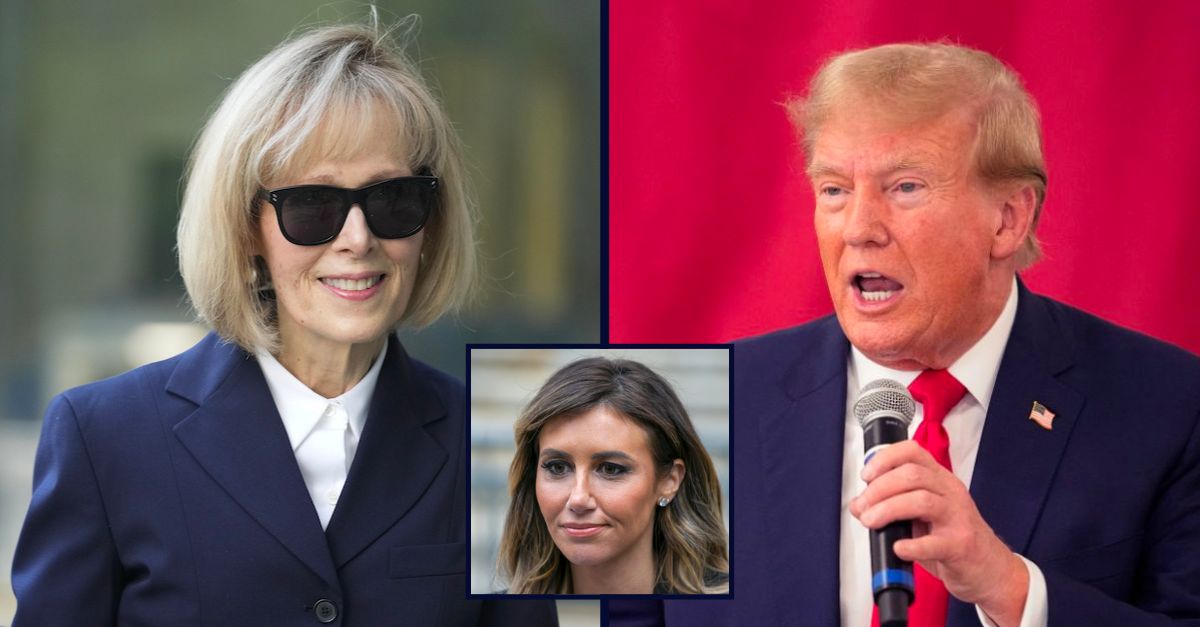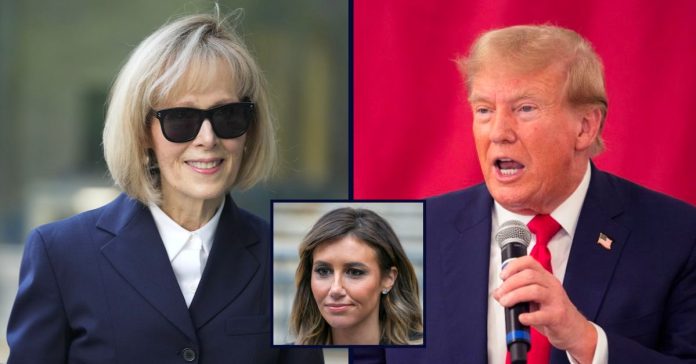
Left: Former advice columnist E. Jean Carroll arrives to federal court in New York, Wednesday, April 26, 2023 (AP Photo/Seth Wenig). Right: Republican presidential candidate and former President Donald Trump speaks at the South Texas International Airport, Nov. 19, 2023, in Edinburg, Texas (AP Photo/Eric Gay, File). Inset: Donald Trump’s lawyer, Alina Habba, speaks to the media outside the New York City courthouse on Monday, Nov. 6, 2023, in a lawsuit accusing him of fraudulently inflating his net worth in financial statements to lenders and others (AP Photo/Ted Shaffrey).
The judge overseeing the defamation case against Donald Trump has provided a withering takedown of the former president — and his lawyer Alina Habba — in a ruling explaining the decision not to declare a mistrial.
In a 30-page opinion issued Wednesday, U.S. District Judge Lewis Kaplan took the chance to explain why he had previously denied two mistrial requests by Habba over the course of writer E. Jean Carroll’s lawsuit against Trump over defamatory statements he made after she went public with her sexual assault accusations against him. That defamation case resulted in an $83 million verdict for Carroll, who had also successfully sued Trump for sexual abuse and was awarded $5 million for his 1990s assault of her in a New York department store dressing room.
Kaplan said that the purpose of his opinion was to provide details as to why he denied two mistrial requests — one oral, one written — from Habba during the defamation trial.
“The Court immediately denied it, partly because it was untimely (in light of defendant’s awareness of the essential facts for nearly a year before trial) but, more importantly, because the motion made no sense,” Kaplan said of Habba’s oral mistrial motion. “Indeed, granting a mistrial would have been entirely pointless.”
Reminding the parties that in this context, a mistrial is “[a] trial that the judge brings to an end without a determination on the merits because of a procedural error or serious misconduct occurring during the proceedings,” Kaplan said that declaring a mistrial in this case “would not have remedied an improper disposal of electronic communications, if any there was.”
“It would not have ended this case,” he added. Instead, the judge reasoned, a new jury would have to be found and the trial restarted, and the same issue “would have carried forward, unresolved, into the second trial. Declaring a mistrial would have served no useful purpose.”
Kaplan then addressed Habba’s actions somewhat more directly, noting that an “undaunted” defense counsel “again sought a mistrial,” specifically asking Kaplan to reconsider his denial of her oral mid-trial motion.
“But that application was at least doubly frivolous,” the judge wrote, noting that Habba didn’t introduce any new evidence or change in law that would support reconsideration, and instead relied on the same testimony.
Kaplan says that even if he had reconsidered the mistrial motion, he would have denied it anyway “because it was entirely baseless and would serve no useful purpose.”
“The written motion before the Court is no more timely, and granting it would be no more sensible, than the oral motion during the trial,” he wrote. “Indeed, granting it now would be even less sensible.”
“A mistrial at this point would be a bootless exercise,” he added.
Kaplan also addressed his reasons for denying Habba’s request for sanctions, specifically for Carroll’s testimony that she received death threats and her “willful violation” of discovery obligations.
The judge explained that when Carroll deleted the death threats she received after Trump’s June 2019 statements, she was not considering suing the then-president.
“It was not until attorney George Conway in mid-July 2019 explained to her the idea and the process of litigation that she first truly considered suing Mr. Trump,” the ruling says. “Mr. Trump offered no evidence to the contrary. Accordingly, Ms. Carroll had no duty to preserve any [electronically stored information] before mid-July 2019.” In other words, she deleted the message before she began considering suing Trump, so there was no violation of discovery obligations and sanctions aren’t warranted.
Kaplan notes that it’s possible Carroll did delete some electronically stored information after anticipating litigation that “should have been preserved,” but that assumption, “even if accurate, would be far from sufficient to warrant relief.” The judge says that Trump knew as early as January 2023, through Carroll’s deposition testimony, that Carroll had deleted some of the threatening messages — but he offered “no evidence that he ever even attempted to recover any of these messages through discovery or otherwise.”
Even now, Kaplan says, Trump doesn’t even argue that the messages “have been permanently lost and are now recoverable.”
“This failure alone was sufficient basis to deny the alternative relief he sought,” the judge wrote.
Trump’s argument that he suffered prejudice from the deletion of the messages also fell flat for Kaplan. Trump had argued that he was unable to show that the threats might not have “mirrored” his own defamatory statements and therefore couldn’t argue that he wasn’t the source of the threats.
But as Kaplan noted, that could have actually ended up working in Trump’s favor.
“[I[t is at least equally likely that the deletion of such messages benefited Mr. Trump by removing from the jury’s consideration a significant number of violent threats made against Ms. Carroll in the wake of Mr. Trump’s statements,” Kaplan wrote. “With fewer examples to show, Ms. Carroll’s case for damages was weakened, and Mr. Trump benefited as a result.”
Adding to the cascade of reasons why Trump’s motion failed, Kaplan says that Trump’s motion wasn’t timely — and nor was it appropriately brought to Kaplan’s attention, as Habba “did not raise the issue with the Court until the middle of cross-examination of Ms. Carroll, in the presence of the jury, and with no prior notice” to the judge.
“Not only were the actions of Mr. Trump’s attorney in raising this discovery issue in the presence of the jury needlessly prejudicial to Ms. Carroll, but her motion for sanctions pertaining to a discovery issue that defendant sat on for about one year was ‘untimely’ under any construction of the term,” the judge wrote.
Finally, the judge said that any remedy that could be granted for Trump’s motion was already provided by the trial itself.
“[E]ven if the Court were inclined to grant any relief to Mr. Trump, which it is not, he would not be justified in receiving anything more than what already occurred during trial — that is, cross-examination of Ms. Carroll on her deletion of ESI before the jury and arguing those deletions during summation,” the judge wrote.
Read Kaplan’s ruling here.
Have a tip we should know? [email protected]

